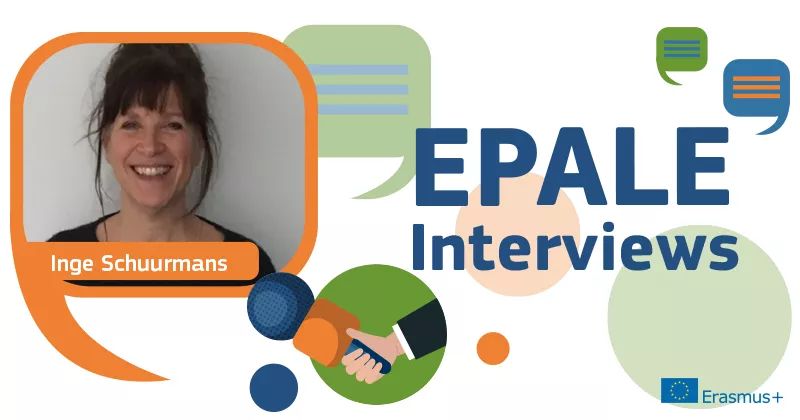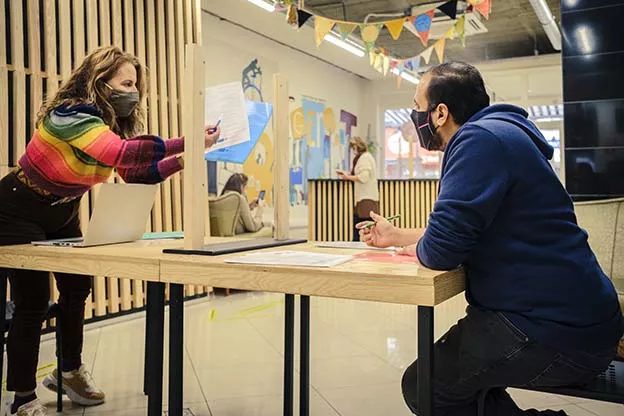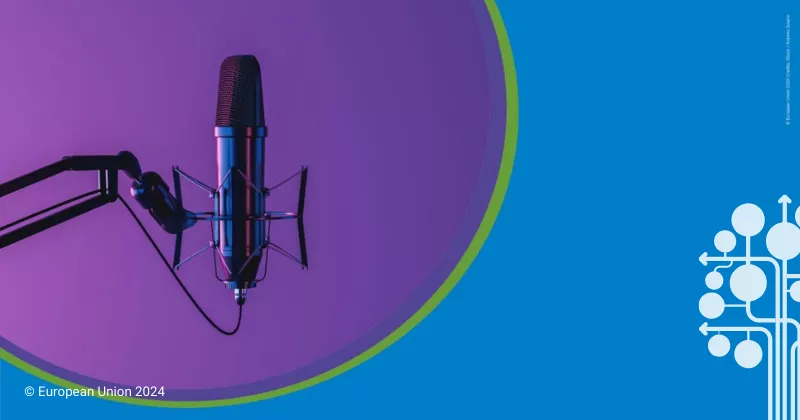EPALE interview: Inge Schuurmans (BE)

In 2020 the world seemed to stand still for a moment. Basic Education Center Antwerp (BE) also had to close its doors for a few months. Inge Schuurmans is director of the Basic Education Center in Antwerp. “Like so many of us, we had to look for alternatives to help our learners continue to learn,” she says. During the first lockdown, the center focused on keeping in touch with the students. Just ask them how things were going, give them simple assignments via whatsapp, a sidewalk visit, and so on. In May they expanded this and gave their learners more assignments to do at home, digitally or on paper.
EPALE: How did this change caused by corona work out?
Inge Schuurmans: Distance learning is very difficult for our low-literate adult learners. But it was also a new challenge for our teachers. However, the solidarity among our teachers became immediately clear: colleagues spontaneously exchanged tips and exercises. We quickly created a platform for this exchange on our existing intranet. In the meantime, we are giving extra attention to digitization via the DigiLab working group, where employees can turn to with their questions. DigiLab also indicates which training courses are necessary, in the first place to make our employees media literate. In this way, the teachers can provide our learners with an even better e-inclusive offer, which in turn makes them more skilled at it. After all, digital skills have now become really indispensable in our society, not only for education, but also for finding work, keeping in touch with the children's school, and so on.
Fortunately, the complete lockdown did not last. In June, limited teaching in class was allowed again. How did that go?
That's right, and since the autumn break our students have been offered a combination of classroom lessons and distance learning ('combined learning'). Our teachers provide extra support for online education with non-digital learning resources, such as exercise bundles on paper. Despite all the efforts we make to support our learners, some dropped out: due to the lack of face-to-face education or due to the fear of contamination.... At Atlas, the Agency for Civic Integration and Integration Antwerp, registrations for Dutch courses also decreased. In addition to distance learning and digitization, keeping up our student numbers will be an important challenge in 2021.
You also had to make a lot of adjustments to ensure the safety of the students and teachers?
Yes, and as a result, our prevention advisor worked some overtime in 2020 because, first and foremost, he always had to follow the legislation and guidelines. Together with his colleagues, he has made every effort to make the work and classroom environment as safe as possible: rearrange classes, face masks, handles and screens plexi glass, and so on. We consulted with other centers for adult basic education in Flanders to figure out specific action plans.

Picture: François De Heel
How did your employees and teachers experience this crisis, which is still ongoing?
Corona put a lot of pressure on the well-being of our employees and their connection with our center. We sent them a corona update by e-mail every week, we informed everyone as best we could and tried to take away some of the uncertainty. At the end of October, when the corona peak in our country soared again, we held an online briefing, for the first time, with more than a hundred participants. Also on a smaller scale we tried to keep a finger on the pulse by means of conversations and question times between management and employees, and team leaders and team leaders who walked with their employees. During training days, we organized space for online exchange moments.
How do you look at the future?
It is clear that in 2021 we will have to continue working on the challenges that corona poses for us: improving the digital skills (of colleagues and learners) and dealing with the effects of corona on our student numbers. The temporary closure of our center and lower attendance afterwards will undoubtedly affect our financing in the coming years. In the meantime, we have received the good news that the government will provide compensation. However, this does not change the fact that it will be quite a challenge to lead new students to our lessons. But we won't stop trying. In February we started with a new concept: the Open Learning Salon. People can get acquainted with basic education in an accessible way at various places in Antwerp and at our other teaching location in Kapellen. Hopefully this will help more people find their way to our center. We are also looking for other ways to attract new students. For example, in spring we will offer sessions that respond to current challenges that our learners face and that have become more acute by corona: lessons for parents, job seekers and for students who have broader learning questions. For parents this concerns, for example, parenting support, working with Smartschool, looking for suitable leisure activities, ... We want to strengthen jobseekers in their search for work. We make sure all these new lessons and sessions will be e-inclusive.






